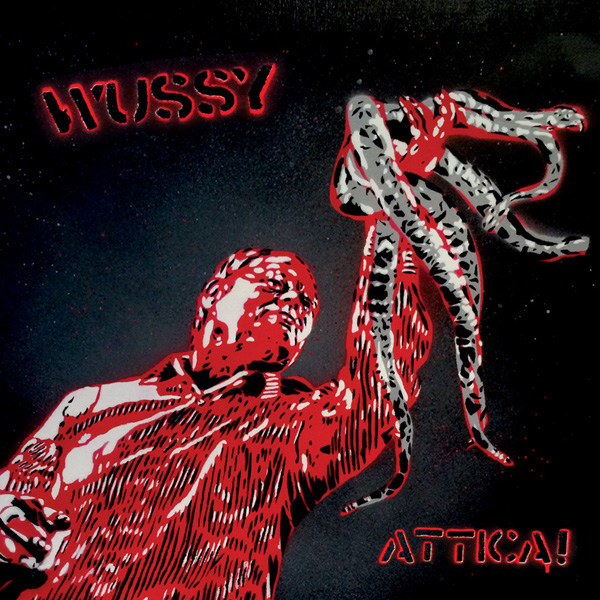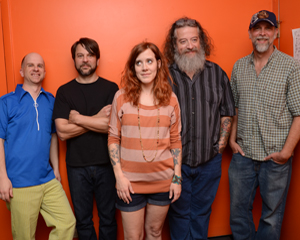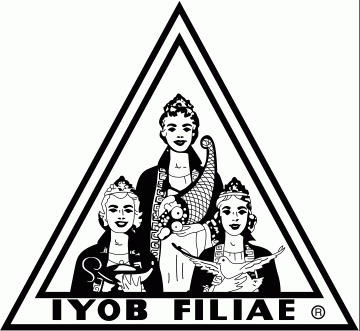 Having told you repeatedly of the wonders of Wussy, I've been feeling oddly reticent about writing at more length about their latest album Attica. There's certainly a lot to say, but a lot has already been said - and said pretty well. The band may not have the most numerous fanbase in rock but they certainly have one that is thoughtful and articulate.
Having told you repeatedly of the wonders of Wussy, I've been feeling oddly reticent about writing at more length about their latest album Attica. There's certainly a lot to say, but a lot has already been said - and said pretty well. The band may not have the most numerous fanbase in rock but they certainly have one that is thoughtful and articulate.
Exhibit A in making that case has to be an impressive essay by Charles Taylor in the LA Review Of Books, which convincingly locates Wussy's work within a broader and resonant take on life at a certain age in the USA of 2014. I'm going to focus on Attica's music rather than Wussy's wider positioning, but will take a quote from Taylor as a starting point for some song-by-song comments:
Wussy approach rock and roll as people who are past the age when they look to the music for salvation or as a soundtrack for their rebellion. But because they are fans, because this music has long been their chosen vehicle for expression, they test it to see if it can still provide a kind of transcendence, or at least a way of speaking that will make sense of the life around them.
That sounds right to me: Wussy are grown-ups who make their music because that is what they want to do, not because any financial expectations require it. Unlike some bands producing their fifth full album, they're not treading water and churning out another elpee's worth of tunes in a trademark style, desperate to live up to someone else's expectations. They have the space to stretch and experiment and have fun. And they sound unmistakably like they're singing from the real world, not some rockist cocoon or genre bubble.
 So what have we got?
So what have we got?
'Teenage Wasteland' is a cracking opener: a recollection of the transcendent power of music, delivered with a powerful, lush and layered sound, all underpinned by a simple one-fingered keyboard motif. Lisa Walker's lead vocal is simply gorgeous (if a little overladen with effects in the recording?), reliving the memorable moments with both excitement and control. Chuck Cleaver's backing vocals are spot-on: the two main voices fit so well together and this song features a number of those typically Wussy moments where the harmony is saying something different from the lead, as if they're a couple talking over each other, whether in excitement or disagreement... The song is focused on The Who's 'Baba O'Reilly' from the Who's Next album, with the lyrics name-checking Pete Townsend and Keith Moon, whose
kick of the drum went off like artillery fire,
but it could be about any great rock song that really made a connection with the adolescent you:
For one short breath it sounds like the world is ending,
Exploding in space and beginning again,
So far away.
And the real triumph of 'Teenage Wasteland' is to embody such a song itself, with the power to make this cynical 50-something bounce up and down grinning like a buffoon. So why am I quibbling about the effects on the vocal? Because they mean you need to turn to the lyric sheet fully to appreciate the evocative and well-crafted words, which is always a shame in hindering full communication. I get it, but not every listener will make the effort.
Chuck Cleaver's 'Rainbows & Butterflies' is next up. Grabbing you by the lapels, thrashier, noisy guitars, more distortion. It's a love song of strength and passion, where the conventional romantic imagery of the hookline is shot through with something darker, and borderline psychotic:
I'm gonna suck you, until the poison comes out.
I wanna sway you, if you're ever in doubt.
You'd be flattered to receive a Valentine's card from this character, but you might also consider changing the locks. The performance is tight and convincing and the song only just tops 3 minutes: punk lives, in both the discipline and attack.
'Bug' maintains the mood, introduced by a burst of studio chat and noise before the crunching guitars start up again, at a slower tempo, but just as relentless. Co-written by Cleaver and Walker, with Lisa taking the lead vocal, it's a song of obsession, if not quite love:
You're the drink, you're the drug,
You're the bug that's alive inside of me.
Excellent sequencing then takes us to the light and sprightly 'North Sea Girls', another of Lisa's songs, which first appeared on last year's Wussy Duo EP. It seems to be a holiday postcard from the European tour she had done with Chuck the previous autumn. In that context the song's arresting opening couplet is less bizarre than it might seem:
Today we gather werewolves
And storm the castle doors.
The other act on the tour was American Werewolf Academy and you can imagine them being rounded up, tired and hungover, for a sightseeing trip before the evening's gig. The song has a chiming crystalline quality from massed (but tightly controlled) guitars and keyboards, the pedal steel evoking shoreline gulls. As well as a description of new sights, it's an encouragement of new experiences:
Just go in, just go in,
Like it's summertime.
The last track on what will be side one of (hurrah!) a forthcoming vinyl release is Chuck's 'Acetylene'. It opens prettily with a solo fingerpicked guitar before diverting somewhere darker. Nora Barton's cello and the long sustained guitar tones, hovering on the edge of feedback, underscore a sad plea for a redeeming love which seems unlikely to materialise. Sweetly sung and a well-wrought arrangement.
'To The Lightning' lifts the energy levels at the start of the second side, with soaring vocals, chiming guitars, crashing drums - and even a theramin in the mix. Lyrically it's far from straightforward: there seems to be a relationship breaking up, with the singer embracing the power of a thunderstorm, finding the energy to move on. But what are we to make of Lisa's parallel narrative about 'Monica' inviting her to a meeting of Job's Daughters,
But hey I don't think I'll be there?
 I hadn't heard of Job's Daughters before. Apparently it is an organisation for the young daughters of Freemasons, dedicated to good works. And there is a version of its emblem featuring as the artwork on the Attica CD. (It doesn't actually say Wussy or Attica anywhere, so this is what you need to look for if you mislay it...)
I hadn't heard of Job's Daughters before. Apparently it is an organisation for the young daughters of Freemasons, dedicated to good works. And there is a version of its emblem featuring as the artwork on the Attica CD. (It doesn't actually say Wussy or Attica anywhere, so this is what you need to look for if you mislay it...)
A traumatic experience in Lisa or Chuck's youth - who knows? It's always nice to have something inexplicable buried in a lyric, when the overall song works as well as this one does. There's definitely a strong internal logic at work, as it resolves in a gentle and lovely coda, the two voices coming together, apparently accepting their parting:
Bide your time
And when the time arises
Rise and shine
And let me go.
The next track 'Halloween' holds that calm and reflective mood. It may well be my favourite song on an album with some strong contenders for that title. There's a lovely arrangement, blending accordion and pedal steel and mandolin, for a song that is a photo-sharp picture of a dreamlike recollection - which is not a straightforward trick to pull off. It references Neil Young's 'Sugar Mountain' and echoes that song's wry nostalgia and warmth. Despite its title, it seems to be set on an Ash Wednesday, the morning after a Mardi Gras, suggested in an immediately engaging opening (replete with a nod to Kris Kristofferson):
We're lost in the town, wiping fog out of our eyes,
A Wednesday morning coming down.
You're last out the door, trying to piece together
All the shit you saw the night before.
It's beautifully done.
Then the mic passes back to Chuck for 'Gene, I Dream', a fine portrait of a troubled relationship and a yearning for a fresh start, with added interest from the twist that it is not entirely clear who is who amongst the narrator, 'Gene' and the couple being described. Anyway, the chorus links with an upbeat arrangement to send you out feeling hopeful, even if the hopes will not ultimately come good:
Gene, I dream that life outside of here
Is so much more amazing
Than either one of us could ever imagine.
Next up is the title track, 'Attica!', the exclamation mark indicating that the word is being shouted in the street. I gather this is a reference to the film Dog Day Afternoon, where this word is indeed shouted during a bank robbery that goes wrong, and is referring in turn to the Attica prison riot in New York in 1971 which left 43 people dead. Sadly, however, I have not seen the film so am not the best person to steer you through the lyric. I'll get back to you when I've caught up... Anyway, nicely sung by Lisa and another carefully layered arrangement, featuring - I think - ebowed guitar.
On to 'Home', the penultimate track. Nice enough, but one of the lesser songs on the record, I'd say. Well played and sung and the theme of optimism through adversity chimes with much of the rest of the set, but nothing really to stand out, musically or lyrically.
Which gives 'Beautiful' even more force, I guess. This is one of Cleaver's very best, a bitter-sweet reflection on a failed relationship and the faults of a younger self. There's a soaring melody with intertwined voices ending in a glorious guitar solo, surging against a repeated keyboard pattern and rolling bass. There's a determined chirpiness in some of the lyrics and the symbol of a house fire, inevitably undercut by regret:
Our everyday attire, we lost it in the fire.
Now we're sifting through the cinders and the ashes.
Searching for a sign, the remains of yours and mine,
Suspecting all along
We may have saved it if we'd only taken time.
(A nice echo there of the yours and mine piles of household effects assembled by the warring protagonists of the Wussy classic 'Airborne'.) And as well as tension and beauty we have a final mystery: what exactly are we to make of the hookline?
I'm not the monster that I once was: 20 years ago I was more beautiful than I am today.
We are left pondering the meaning of beauty as the final chords fade: a bonus philosophical coda. Can't the appreciation of former monsterhood add to beauty, counterbalancing the odd grey hair or wrinkle? I'd like to think so, but maybe the song's narrators think otherwise.
Anyway, eleven songs that are well repaying repeated listenings: there's a lot of depth in the writing and immense skill and care in the way that the music has been put together. I am conscious that I haven't said much to single out contributions from bassist Mark Messerly, drummer Joe Klug and pedal steel man John Erhardt - that's mainly because they're all mostly interested in cohesion and collective sound, and contribute on a range of other instruments too. They all play splendidly, but this is very much a band album, with no individual grandstanding.
And what a band - I hope they make it across the Atlantic soon.